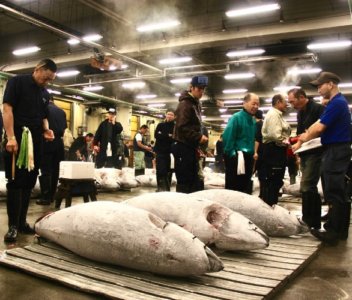Turning the tide on conservation
By Mark Campbell | Photos provided
 All through her childhood, Laurenne Schiller had dreams of being a large mammal veterinarian at an aquarium, possibly the Vancouver Aquarium, which she frequented with her family. But when she was preparing for exams in her second year of undergraduate studies, she read Carl Safina’s Song for the Blue Ocean and had an epiphany.
All through her childhood, Laurenne Schiller had dreams of being a large mammal veterinarian at an aquarium, possibly the Vancouver Aquarium, which she frequented with her family. But when she was preparing for exams in her second year of undergraduate studies, she read Carl Safina’s Song for the Blue Ocean and had an epiphany.
The book was not only her introduction to Atlantic bluefin tuna but also the human impact on the species. It experienced a reported 90 per cent decline in its population biomass from fishing in less than 50 years. “That blew my mind,” she says. “I thought, ‘If this is happening with one species, what are we doing to the whole ocean?’ And I became interested in exploring how we could do better.”
Since then, Schiller has devoted herself to answering that question. She earned a Master of Science in Zoology and worked with Ocean Wise, a marine conservation organization. Now, she is enrolled in the Interdisciplinary PhD program at Dalhousie, where she is wrapping up a PhD thesis through the Marine Affairs Program that could significantly enhance our efforts to protect all tuna species.
Schiller is analyzing how fishing companies and environmental organizations contribute to the management of international tuna fisheries. “I’m interested in how these stakeholders can effect positive change in marine conservation,” she says. “Dalhousie obviously is a global leader in fisheries and marine ecology research, and the program has a strong focus on fisheries management and policy issues, so it was a perfect fit for doing my PhD.”
An upward trend
 Over the course of her studies, Schiller found that more than 25 per cent of the world’s tuna are caught by fisheries with Marine Stewardship Council (MSC) eco-certification, which demonstrates a dedication to sustainability. Since completing this work as part of her thesis, she has found an additional 150 per cent increase in the number of fisheries involved in this program.
Over the course of her studies, Schiller found that more than 25 per cent of the world’s tuna are caught by fisheries with Marine Stewardship Council (MSC) eco-certification, which demonstrates a dedication to sustainability. Since completing this work as part of her thesis, she has found an additional 150 per cent increase in the number of fisheries involved in this program.
“That’s over just two years, and it’s happening so quickly that it’s hard to keep up,” Schiller says. “Fisheries realize that, if they have this label, major retailers such as Walmart want their product. As a result, eco-certified fishing companies have become one of the strongest voices for improved international management measures, which would have been completely unheard of a couple of decades ago.”
Despite this encouraging development, Schiller has some concerns. Not all tuna stocks are healthy so the ability of fisheries to obtain MSC eco-certification is limited. As a result, fisheries and environmental groups are exploring Fishery Improvement Projects, which are promising but dilute overall sustainability efforts. There is also the risk that many small-scale fisheries could be pushed out of the marketplace because they lack the capacity to pursue eco-certification.
“Almost all tuna fisheries also need to do more to address the issues of bycatch, which is the wildlife caught in addition to the tuna,” she says. “Ultimately, I’d say the trends we are seeing make me optimistic about the future, but there is still considerable progress that needs to be made, and eco-certification is just one part of the puzzle.”
Future focused
 Like many Dalhousie Marine Affairs alumni before her, Schiller plans to continue making a difference in ocean conservation once her PhD is finished. Starting this fall, she will be looking at how Canada can meet its goal to achieve 100 per cent sustainable management of its marine resources by 2025 as a winner of a Liber Ero Fellowship.
Like many Dalhousie Marine Affairs alumni before her, Schiller plans to continue making a difference in ocean conservation once her PhD is finished. Starting this fall, she will be looking at how Canada can meet its goal to achieve 100 per cent sustainable management of its marine resources by 2025 as a winner of a Liber Ero Fellowship.
“Approximately 70 per cent of Canada’s commercially valuable fish stocks are either unhealthy, or lack scientific data to assess their health,” she explains. “My goal is to synthesize how government, fishing companies, environmental groups, Indigenous rights holders and other stakeholders have contributed to ocean conservation efforts in the past. If we can get a better sense of what has worked, and what hasn’t, that will enable us to implement more effective evidence-based marine conservation practices going forward.”